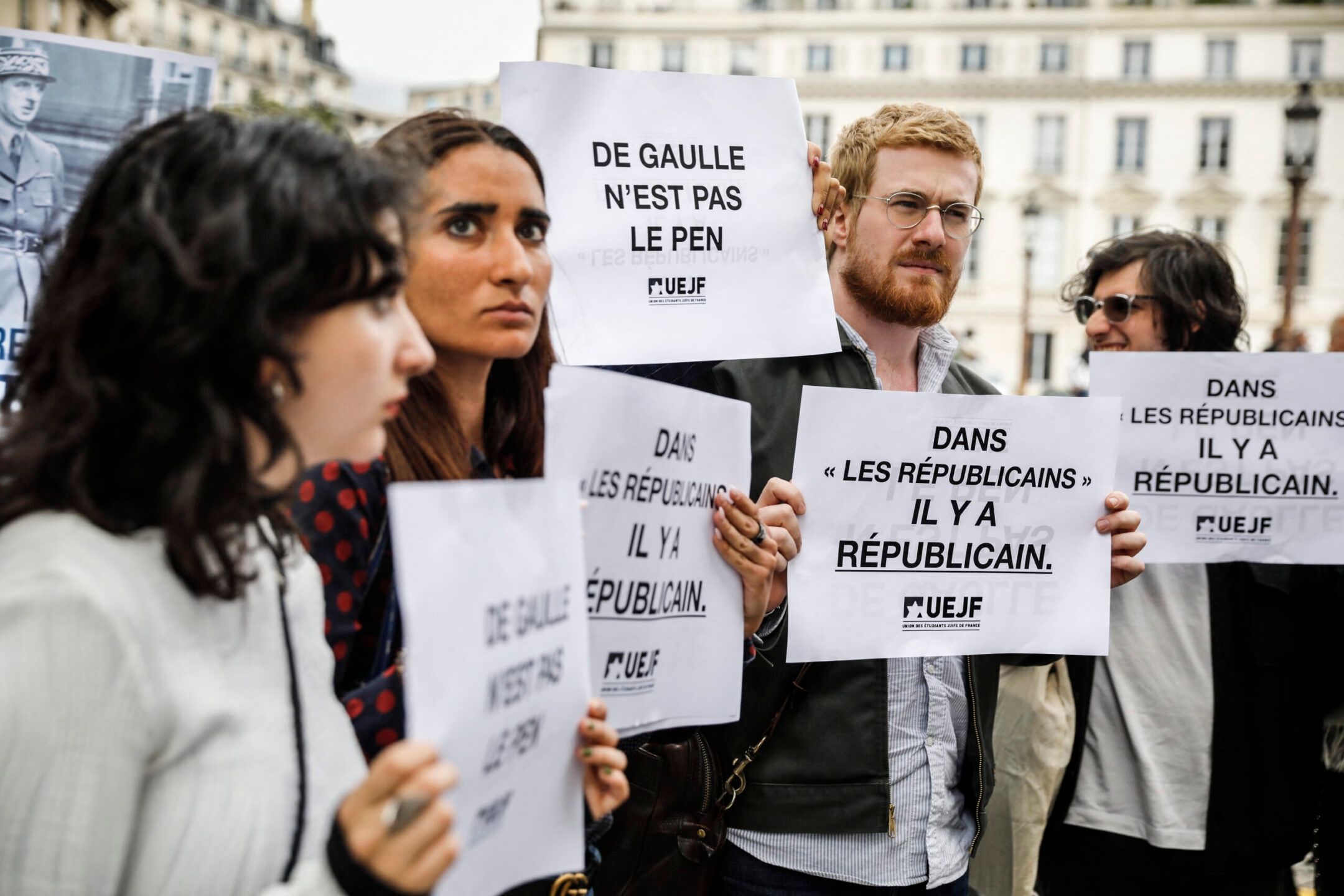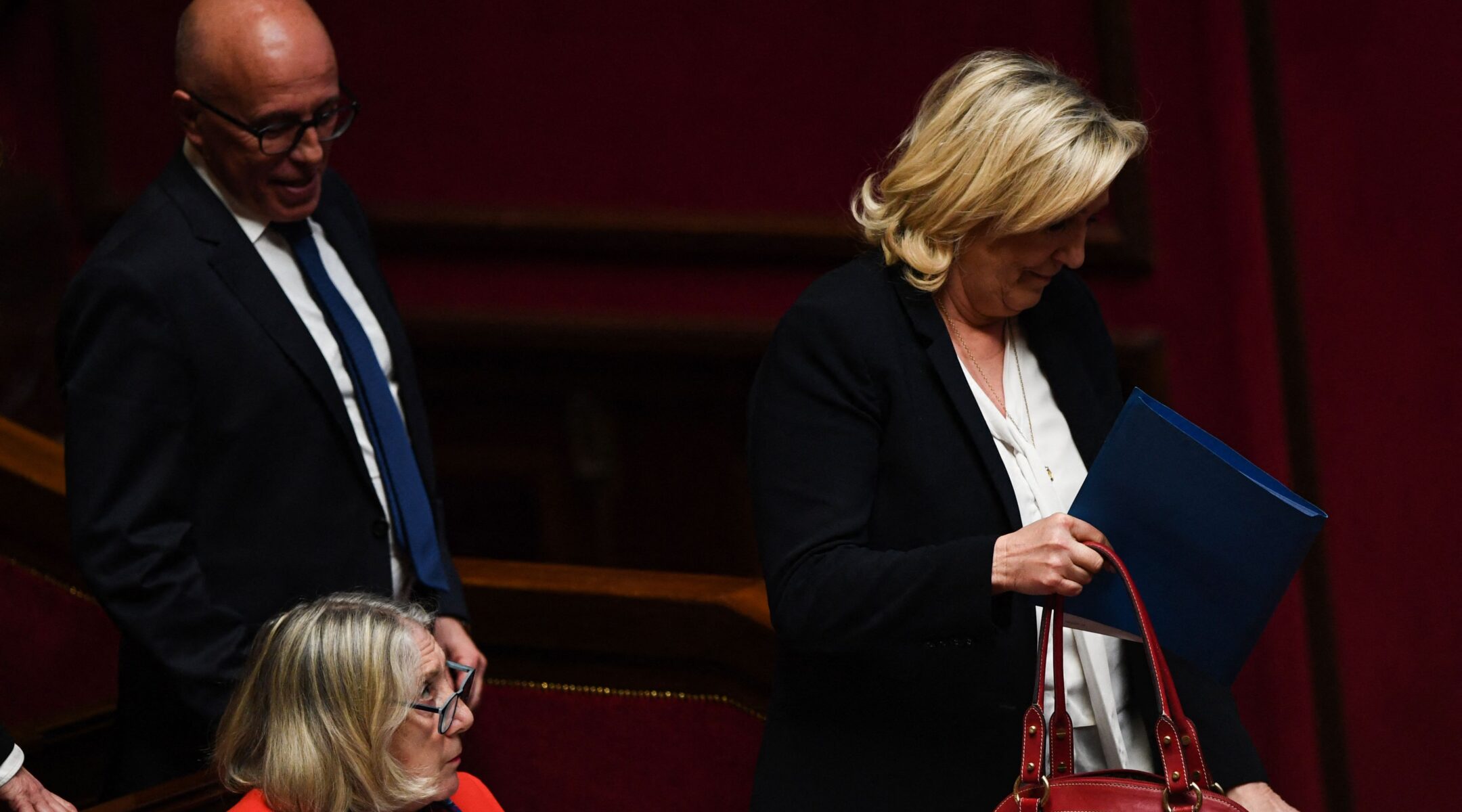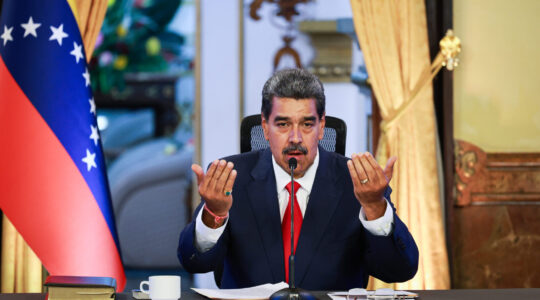(JTA) — France’s mainstream conservative party may join forces with the far right, shattering a decades-long political norm to shun a party with a history of antisemitism.
Eric Ciotti, president of the right-wing Republicans (known in French as Les Républicains), called for a country-wide alliance with the National Rally (or Rassemblement National) during a television appearance on France’s TF1 on Tuesday.
“We say the same things so let’s stop making up imagined opposition,” said Ciotti, becoming the first establishment leader in modern French politics to seek an alliance with the National Rally, led by three-time presidential candidate Marine Le Pen.
Ciotti said he hoped to hitch the increasingly “weak” Republicans to the success of the National Rally, which won a historic victory in the European Parliament elections on Sunday, scoring over 30% of the vote and crushing President Emmanuel Macron’s centrist alliance. France’s results matched a surge of far-right parties across the continent, including gains in Italy and Germany.
In response to the defeat, Macron dissolved parliament and called a snap election for June 30 and July 7. But his gamble on stalling France’s lurch to the far-right may backfire: The National Rally has already been forecast to win the election.
In the past, France’s establishment parties have joined to block power from the anti-immigration, Eurosceptic National Rally, long known for its antisemitic roots. The party was founded in 1972 by Jean-Marie Le Pen, Marine Le Pen’s father, as the National Front. Jean-Marie Le Pen, 95, has been repeatedly convicted of antisemitic hate speech, famously calling the Nazi gas chambers a mere “detail” of World War II and saying the Nazi occupation of France was not “particularly inhumane.”
Another founding member of the party was Pierre Bousequet, a former commander in the Nazi Party’s Waffen-SS.
Since Marine Le Pen took the helm in 2011, she has attempted to scrub the party’s past and win mainstream acceptance. She distanced herself from her father’s antisemitic rhetoric and expelled him from the party in 2015. Meanwhile, she has honed in on Muslims — who make up 11% of the French population — as a threat to the country.
But even as Marine Le Pen has publicly denounced antisemitism, her supporters still disproportionately harbor antisemitic attitudes, according to Nonna Mayer, a political scientist at Sciences Po university.
“Every time we do our surveys, we see that people who are voters or sympathizers of the National Rally are the most antisemitic of all, even though their first target is Arabs, Muslims, Maghrebis,” Mayer told RFI last year, using a term referring to people from North Africa.
Ciotti’s offer to unite with the far-right risks splitting his own party, as he was quickly rebuked by several high-ranking Republicans who demanded his resignation.
Olivier Marleix, the party’s leader in the lower house of parliament, said on X, “Eric Ciotti only speaks for himself. He must leave the presidency of the Republicans.”
Gérard Larcher, another Republican leader and president of the French Senate, also said that Ciotti “can no longer chair our movement and must resign.”

The Union of Jewish Students of France, UEJF, demonstrated outside the headquarters of the Republicans party, in Paris, June 11, 2024. (Laure Boyer/Hans Lucas/AFP via Getty Images)
Interior minister Gérald Darmanin, a former Republican who left for Macron’s party, compared Ciotti’s announcement with the 1938 Munich Agreement — in which France, Britain and Italy attempted to appease Hitler by allowing Germany to annex part of Czechoslovakia one year before the outbreak of World War II.
Ciotti “brings dishonor to the Gaullist family,” said Darmanin. He referenced the Republican party’s line of descent from a right-wing party founded by former President Charles de Gaulle after World War II, when de Gaulle fought against Nazi Germany and the Vichy collaborationist regime.
The Union of Jewish Students of France called a snap rally on Tuesday in response to Ciotti’s announcement. “Let’s be numerous. No to compromise,” the group tweeted before dozens of people demonstrated outside the Republicans headquarters, carrying signs that said, “De Gaulle is not Le Pen.”






